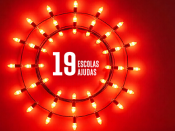Por António Silva (IA).
Abstract: The advent of the ESA Euclid space mission (www.euclid-ec.org) brought new critical challenges to the numerical modeling of large-scale structure (LSS) in the Universe. On one hand, the mission science requirements impose levels of accuracy on a wide range of length and mass scales that implied a new exascale computing model, never achieved in cosmology. On the other hand, new physical effects and “alternative” (to LambdaCDM) cosmology scenarios also require new survey dedicated simulations to realistically assess model signatures and degeneracies, and to develop optimal estimators and efficient data analysis pipelines. In this talk I will provide with a brief introduction to the numerical techniques that can be used to model the formation evolution of cosmological structure, and describe the ongoing efforts to obtain a new set of LSS simulations that achieve the required accuracy for the baseline cosmology of Euclid as well as explore “additional” physics and “alternative” cosmologies to be tested against observational data.
Short bio: A. da Silva's main research is in observational Cosmology and numerical Astrophysics, in the topics of formation and evolution of cosmic structure, CMB radiation and the physics of Galaxy Clusters. He has been an active member of the largest international consortia for observational Cosmology: the ESA Euclid and Planck satellite missions. He obtained his PhD in Physics - Astronomy by the University of Sussex, UK. He is currently an Investigador FCT (development level) at the DF-FCUL. Previously he was Prof. Auxiliar Convidado, also at the DF-FCUL, and investigador Ciência 2007 at CAUP. Before these, he had research contracts and a Marie-Currie position in France at the (IAS – Paris and at OMP – Toulouse) as well as prestigious visiting grants at LATT in 2009 by CNRS, France; and at NAOJ Mitaka in 2004 by the JSPS, Japan.













